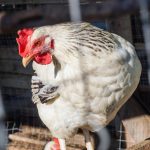Chickens are social animals that thrive in flocks, exhibiting a natural pecking order with dominant and submissive individuals. Understanding this hierarchy is essential for maintaining a harmonious coop environment. Adequate space is crucial to allow chickens to establish their social structure without overcrowding.
As diurnal creatures, chickens are most active during daylight hours and roost at night. Providing a secure coop for roosting is vital for their well-being. Chickens are natural foragers, enjoying scratching and pecking at the ground for insects and plants.
A spacious outdoor area encourages this behavior and promotes their overall health. Chickens are sensitive to temperature extremes, necessitating proper ventilation in hot weather and insulation during cold periods. They also possess strong maternal instincts, often seeking secluded areas to lay eggs.
Providing adequate nesting boxes ensures a safe and comfortable environment for egg-laying. These birds are highly social and benefit from flock interactions. However, they are also sensitive to loud noises and sudden movements.
Creating a calm, peaceful environment helps chickens feel safe and secure. Understanding and accommodating these natural behaviors and instincts is crucial for maintaining a healthy and thriving chicken population.
Table of Contents
- 1 Creating a Clean and Comfortable Coop Environment
- 2 Providing Adequate Nesting Boxes
- 3 Regularly Cleaning and Maintaining the Coop
- 4 Using Chicken-Friendly Deterrents
- 5 Implementing a Regular Feeding and Cleaning Schedule
- 6 Seeking Professional Advice if Necessary
- 7 FAQs
- 7.1 What are some common reasons why chickens poop where they lay eggs?
- 7.2 How can I prevent chickens from pooping where they lay eggs?
- 7.3 What are some effective methods for keeping chickens from pooping in the nesting boxes?
- 7.4 Are there any natural deterrents to keep chickens from pooping in the nesting boxes?
- 7.5 What are the potential health risks of chickens pooping where they lay eggs?
Key Takeaways
- Chickens are social animals and have a natural pecking order within their flock
- A clean and comfortable coop environment is essential for the health and well-being of chickens
- Adequate nesting boxes provide a safe and comfortable space for hens to lay their eggs
- Regular cleaning and maintenance of the coop is crucial to prevent the spread of disease and parasites
- Using chicken-friendly deterrents can help keep predators and pests away from the coop
- Implementing a regular feeding and cleaning schedule helps to establish a routine for the chickens
- Seek professional advice if you encounter any issues or concerns with your chickens’ behavior or health
Creating a Clean and Comfortable Coop Environment
Regular Bedding Changes
To create a clean environment, it’s important to regularly remove soiled bedding and replace it with fresh, clean bedding. This will help keep the coop dry and odor-free, as well as provide a comfortable space for the chickens to roost and nest.
Cleaning the Coop
In addition to regular bedding changes, it’s important to regularly clean the coop walls, floors, and nesting boxes to remove any built-up dirt, dust, or droppings. This can be done using a mild detergent and water, or a natural cleaning solution such as vinegar or lemon juice.
Proper Ventilation
Keeping the coop clean will help prevent the buildup of bacteria and parasites, as well as create a more pleasant environment for both the chickens and their caretakers. Furthermore, providing adequate ventilation in the coop is essential for maintaining a clean and comfortable environment. Good airflow helps reduce moisture buildup, which can lead to mold and mildew growth. It also helps remove odors and ammonia from the coop, creating a healthier environment for the chickens. Additionally, proper ventilation helps regulate the temperature inside the coop, keeping it cool in the summer and warm in the winter.
Providing Adequate Nesting Boxes

Providing adequate nesting boxes is essential for creating a comfortable environment for your chickens to lay their eggs. Nesting boxes should be secluded, quiet, and dark to provide a safe and comfortable space for the hens to lay their eggs. Additionally, nesting boxes should be lined with clean bedding such as straw or wood shavings to provide a soft and cozy space for the eggs to be laid.
It’s important to provide enough nesting boxes for the number of hens in your flock to prevent competition and stress over laying spots. A general rule of thumb is one nesting box for every 3-4 hens. Additionally, it’s important to regularly check the nesting boxes for any signs of damage or wear and tear, as well as to remove any soiled bedding and replace it with fresh, clean bedding.
Furthermore, providing adequate nesting boxes helps prevent the hens from laying their eggs in undesirable locations such as on the coop floor or in outdoor areas where the eggs are at risk of being damaged or eaten by predators. By providing a comfortable and safe space for the hens to lay their eggs, you can help ensure the health and well-being of your flock while also maximizing egg production.
Regularly Cleaning and Maintaining the Coop
Regularly cleaning and maintaining the coop is essential for creating a healthy and comfortable environment for your chickens. This includes removing soiled bedding, cleaning surfaces, and maintaining proper ventilation. Regular cleaning helps prevent the buildup of bacteria, parasites, and odors that can negatively impact the health of your flock.
In addition to regular cleaning, it’s important to regularly inspect the coop for any signs of damage or wear and tear. This includes checking for holes or gaps in the walls or roof that could allow predators or pests to enter the coop, as well as checking for any signs of mold or mildew growth that could indicate poor ventilation or moisture buildup. Furthermore, maintaining proper ventilation in the coop is essential for creating a healthy environment for your chickens.
Good airflow helps remove odors, ammonia, and moisture from the coop, as well as regulate the temperature inside. This can be achieved by installing vents or windows that can be opened or closed as needed to allow fresh air to circulate through the coop. Regularly cleaning and maintaining the coop is essential for creating a healthy and comfortable environment for your chickens.
By removing soiled bedding, cleaning surfaces, maintaining proper ventilation, and inspecting for any signs of damage or wear and tear, you can help ensure the health and well-being of your flock while also creating a pleasant environment for both the chickens and their caretakers.
Using Chicken-Friendly Deterrents
Using chicken-friendly deterrents is essential for protecting your flock from predators and pests without causing harm to the chickens themselves. There are several natural deterrents that can be used to keep predators such as raccoons, foxes, and birds of prey away from your coop. This includes using motion-activated lights or sound devices that startle predators when they approach the coop, as well as using strong-smelling plants such as lavender or mint around the perimeter of the coop to deter predators with sensitive noses.
Additionally, using physical barriers such as fencing or wire mesh can help prevent predators from gaining access to the coop or run area. It’s important to regularly inspect these barriers for any signs of damage or wear and tear that could compromise their effectiveness. Furthermore, using natural pest deterrents such as diatomaceous earth or herbs like garlic or rosemary can help keep pests such as mites, lice, or flies away from your flock without causing harm to the chickens themselves.
These natural deterrents can be sprinkled in nesting boxes, dust baths, or around the coop to help keep pests at bay. Using chicken-friendly deterrents is essential for protecting your flock from predators and pests without causing harm to the chickens themselves. By using natural deterrents such as motion-activated lights or sound devices, strong-smelling plants, physical barriers, and natural pest deterrents, you can help keep your flock safe while also creating a healthy and comfortable environment for them to thrive.
Implementing a Regular Feeding and Cleaning Schedule

Nutrition and Hydration
A balanced diet is vital for maintaining the health and well-being of your flock. In addition to commercial chicken feed, you can supplement their diet with fresh fruits, vegetables, grains, and protein sources. Fresh water should always be available to prevent dehydration.
Cleaning Schedules for a Healthy Environment
Regular cleaning schedules are essential for maintaining a healthy environment for your chickens. This includes regularly cleaning feeders and waterers with mild detergent and water, as well as removing any spilled feed or debris from feeding areas. Implementing a regular cleaning schedule for nesting boxes helps prevent the buildup of bacteria or parasites that can negatively impact egg production or hatchability.
Maintaining Clean Nesting Boxes
Regularly removing soiled bedding from nesting boxes and replacing it with fresh, clean bedding is crucial for maintaining a healthy environment. This helps prevent the buildup of bacteria or parasites that can negatively impact egg production or hatchability.
By implementing a regular feeding schedule and cleaning schedule, you can help ensure the health and well-being of your flock while also maximizing egg production.
Seeking Professional Advice if Necessary
Seeking professional advice is essential if you encounter any issues with your flock that you are unable to resolve on your own. This includes seeking advice from a veterinarian if you notice any signs of illness or injury in your chickens that require medical attention. Additionally, seeking advice from an experienced poultry keeper or animal behaviorist can help address any behavioral issues within your flock that may be causing stress or aggression.
Furthermore, seeking professional advice from an agricultural extension agent or poultry specialist can provide valuable insights into best practices for managing your flock, including nutrition, housing, breeding, and disease prevention. These professionals can offer guidance on how to address specific challenges you may encounter with your flock while also providing resources for further education on poultry care. Seeking professional advice if necessary is essential for ensuring the health and well-being of your flock while also maximizing their productivity.
By seeking advice from veterinarians, experienced poultry keepers, animal behaviorists, agricultural extension agents, or poultry specialists when needed, you can gain valuable insights into best practices for managing your flock while also addressing any specific challenges you may encounter with their care.
If you’re looking for more tips on keeping your chicken coop clean and efficient, check out this article on creating a garden chicken coop. It offers valuable insights on how to design a coop that encourages chickens to lay eggs in designated areas and minimizes the risk of them pooping where they lay. This resource could provide additional strategies for maintaining a clean and healthy coop environment.
FAQs
What are some common reasons why chickens poop where they lay eggs?
Chickens may poop where they lay eggs due to overcrowding in the coop, lack of clean bedding, or if the nesting boxes are not properly maintained.
How can I prevent chickens from pooping where they lay eggs?
To prevent chickens from pooping where they lay eggs, ensure that the coop is spacious enough for the number of chickens, keep the nesting boxes clean and well-maintained, and provide enough roosting space for the chickens.
What are some effective methods for keeping chickens from pooping in the nesting boxes?
Some effective methods for keeping chickens from pooping in the nesting boxes include using fake eggs or golf balls to discourage nesting, providing separate areas for roosting and nesting, and regularly cleaning and maintaining the nesting boxes.
Are there any natural deterrents to keep chickens from pooping in the nesting boxes?
Some natural deterrents to keep chickens from pooping in the nesting boxes include using herbs such as lavender or mint, or placing citrus peels in the nesting boxes, as chickens tend to avoid these scents.
What are the potential health risks of chickens pooping where they lay eggs?
Chickens pooping where they lay eggs can lead to unsanitary conditions, which may increase the risk of bacterial contamination and the spread of diseases. It can also lead to dirty and soiled eggs, which can pose health risks if consumed.
Meet Walter, the feathered-friend fanatic of Florida! Nestled in the sunshine state, Walter struts through life with his feathered companions, clucking his way to happiness. With a coop that’s fancier than a five-star hotel, he’s the Don Juan of the chicken world. When he’s not teaching his hens to do the cha-cha, you’ll find him in a heated debate with his prized rooster, Sir Clucks-a-Lot. Walter’s poultry passion is no yolk; he’s the sunny-side-up guy you never knew you needed in your flock of friends!







